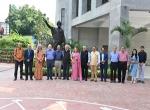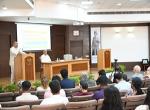A presentation by Major Gen G D Bakshi, Deputy Director (Research), VIF
Major Gen G D Bakshi deliberated on ‘Netaji and Indian National Army(INA): Key catalysts of India’s freedom’ with a presentation on 22nd January 2010, the eve of Netaji’s birthday. He explained how the INA played the most important role in liberating India from the British rule.
The 113th birth anniversary of Netaji Subhash Chandra Bose was celebrated at Vivekananda International Foundation and was attended by a host of eminent personalities from various walks of life who paid homage to the heroic son of Mother India.
On this occasion, Maj Gen G D Bakshi SM, VSM (retd) made a presentation on the seminal contribution of Netaji and the INA to India’s freedom. The Indian Freedom struggle had thrown up a galaxy of great leaders who were talented men of great vision and stature. In retrospect the tallest among them perhaps was Netaji Subhash Chandra Bose. Undoubtedly it was Mahatma Gandhi who had given the freedom movement its mass based character and succeeded in mobilizing India’s vast peasantry. Bose and Gandhi however, had differed sharply over the essential strategic direction and the means and methods of the Freedom struggle. It was a seminal debate that has profoundly affected the very nature of the Indian polity. It is at the root of the subsequent “Hard versus Soft power” orientation of the state per se. This debate merits being reopened today. Contrary to popular perception, non-violence actually had failed to deliver freedom. It had largely been contained and had petered out by the end of the Second World War. Why then did the British leave in such a tearing hurry just two years later? The answer is: it was because of Bose and INA.
Bose’s accomplishments border on the miraculous. Unfortunately because of ideological slants, these have very deliberately been undervalued and unrecognized. In a crass display of triumphalism the British had put three INA officers (a Hindu, a Muslim and a Sikh) on trial in the Red Fort. The news of the INA finally broke out and created a tumult in India. There were mutinies in the Royal Indian Navy and some units of the British Indian Army. Shaken, the British, read the writing on the wall and decided to quit. When the Quit India Movement was petered out it was only the specter of the INA which forced the British to wind up their empire.
Post independence, the Political elite fostered the myth that nonviolence alone had won India its freedom. As a result the Indian nation state continued to under resource and under value “Hard or Military power” and laid inordinate emphasis on soft power. He reminded that the Chinese deflated the Indian soft power balloon in 1962.
What is even more important, however, is the fact that Bose and the INA had tried to fashion a pan Indian identity. That was the core of the Nationalist project per se. Post 1991 however identity based politics has been striking at the very idea of India. A host of apologists of sub national, ethnic, caste and creed based identities are busy celebrating the destruction of a pan- Indian identity. We need to reverse this trend of identity based politics before it unravels the very fabric of our nation hood.
The event, presided by Amit Mitra, the grand nephew of Netaji and the General Secretary of FICCI. He expressed his concern over the increasing disconnect of younger generation from the history. An interactive session followed, in which questions regarding the non recognition of Netaji and his ideas for India charged the atmosphere. There was a collective consensus among the audience about the immediate necessity of rethinking the options of polity for a better India in the way envisaged it.





